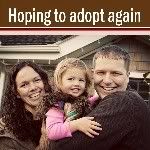Part 2..or 3?
HEALING:
Suggestions on How to Deal with your Grief:
Communication
- Talk about the baby and your feelings with your family and friends
- Try to resume old and new relationships
Nutrition
- Eat a balanced diet that includes milk, meat, vegetables, fruit and whole grains.
- Avoid "junk" and fast foods.
Fluid Intake
- Drink 8 glasses of liquids (Juice, water, soda) per day.
- Avoid drinks with caffeine or alcohol because they may cause dehydration, headaches, and/or lower back pain.
Exercise
- Do something active everyday, such as riding a bike, walking, jogging, aerobics, or stretching. Even a walk around the block can be helpful.
Tobacco and Alcohol
- Avoid tobacco because it depletes the body of vitamins, increases the acidity or the stomach, decreases circulation and can cause palpitations.
- Don't drink alcoholic beverages because they depress body funcion and natural emotional expression
Rest
- Avoid increased work activity
- Maintain rest patterns even if unable to sleep.
Reading
- Read books, articles, and poems that provide understanding and comfort so you do not feel so alone.
(during placement, Dustin and Andrea gave me a book called "No one Can Take your Place" by Sheri Dew and on my birthday they gave me a book by THIS amazing woman called "Prepare now for the Temple". Both of these books are SO uplifing and because I absolutely LOVE to read, they have definitely helped me through these hard times.)
Writing
- Keep a diary or journal of thoughts, memories and mementos.
- Write letters, notes and or poems to the baby.
(my blog! :))
Physical Exam
- Schedule a physical exam about 4-6 months after experiencing a loss because the body is at risk of developing diseases during grief.
Big Decisions or Changes
- Don't move or change jobs or relationship. Wait a while to make these major changes.
- Avoid long trips. Coping mechanisms and reflexes are impaired, making judgements difficult.
- Don't put the baby reminders away until you are ready.
- Don't let other make decisions for you.
Help from Others
- Admit to yourself and family when you need help. This can lessen the pain and lonelinesss.
- Accept help from others. Let them know specific things they can do for you, such a providing food or company.
- Allow family and friends to share your grief and let them offer their support
- Attend a support group. People that have "been there" can give support, help and hope.
Tomorrow will come. The pain will Ease. But you will not forget your precious child.
it takes hope, time and love for healing
to take place. Remember along the way to accept,
but not forget
(Empty Arms, Sherokee IIse)
Included in the healing section was
FORGIVENESS.
What is it?
If you're not sure how to forgive, you're not alone. Actually, very few people understand what forgiveness is and how it works.
One definition: Recognizing you have been wrong, giving up your resentment and eventually responding to the person who has hurt you with compassion.
What forgiveness is not: It's not condoning, excusing, forgetting or denying an offense. And forgiveness does not mean putting yourself back in an abusive relationship.
WHY FORGIVE?
Without forgiveness, bitterness can linger. When we could be enjoying today's pleasures, we are upsetting ouselves with yesterday's injustices.
The person who has hurt you is not the one to lsoe sleep over the hurts. They do not feel your anger or the knot in your stomach. The pain of not forgiving is all yours.
Forgiveness gives us a chance to on to other things. When we forgive we regain control of our lives.
People who are inclined to fogive others enjoy better mental and physical health than those who hold grudges. Unless they are repeatedly excusing someone who is abusive, forgiveness seems to be a postitive act for the one doing it.
There are many other great thing said in this packet about forgiveness.
However,
I have a friend that wrote a post a while ago that spoke of it perfectly.
It was what I needed.
I am one of those people that have an extremely hard time forgiving.
I want to,
but I have a hard time finding that place in my heart TO forgive.
I definitely recommend reading it.
I want to highlight some of the things she said though:
"I know that a lot of us think that we forget about something that hurt us, but then we remember it at the most unexpected times, and you have to go through the whole process again. It sucks. "
"Do not feel bad about struggling with forgiveness. The fact that you feel bad about shows that you are willing to forgive, and you understand the importance of forgiving. You just simply haven’t found out how to do it yet. There are some things that hurt our hearts so much that it would be unreasonable to forgive right away. God knows that. God isn’t unreasonable. He doesn’t require that you run faster than you have the strength to (Mosiah 4:27)."
"“Do not feel guilty or worry if you are struggling with forgiveness. It is easy to takescriptures about forgiveness out of context and assume we must be immediately ready to forgive even serious harm from others.” –President Gordon B. Hinckley"
“I just wanted to say how profoundly sorry I am for this burden you are called to carry. I wish I had answers to all the questions. All I know is that moving from pain to healing is a process.... a process that can't be rushed. I know that peace will come to you. The anger is normal and understandable. It is part of what helps us understand injustices. You will eventually be able to let go of your anger as you give the heaviness of it...the unanswered parts of it to God. What you are going thru right now is the essence of the why the Atonement was accomplished. I use that word on purpose -- accomplished. The same applies to your process. God will lead you to healing. Allow his wisdom to teach you whatever lessons he will as you pass thru it all. Forgiveness will come. It is ok that it isn't all here today.”
I think that this forgiveness stuff was included in this packet because for me PERSONALLY, I had a lot negative feelings after placement.
not just towards others, but mostly towards myself.
I still struggle with forgiving myself.
It is hard for me to not completely HATE myself for this.
It is my fault that I was in this situation in the first place.
Because of something I did, I have suffered more than I have ever suffered in my entire life.
and FINALLY,
How do you know you are healing?
Those persons who have worked with their grief to move toward the dimension of reconciliation should be able to demonstrate:
A recognition of the reality and finality of the adoption of the child.
A return to stable eating and sleeping patterns that were present before.
A renewed sense of energy and personal well-being.
A subjective sense of release or relief (they have thoughts of the child, but are not preoccupied with these thoughts)
The capacity to enjoy experiences in life that should normally be enjoyable.
The establishment of new and healthy relationships
The capacity to live a full life without feelings of guilt or lack of self-respect.
The capacity to organize and plan one's life toward the future.
The capacity to become comfortable with the way things are rather than attempting to make things as they were.
The capacity to being open to more change in one's life.
The awareness that one has allowed self to fully grieve and survived.
The awareness that one does not "get over grief," but instead is able to acknowledge "This is my new reality and I am ultimately the one who must work to create new meaning and purpose in my life."
The capacity to acknowledge new parts of one's self that have been discovered in the growth through one's grief.
That capacity to adjust to the new role changes that have resulted from the loss of the relationship.
The capacity to be compassionate with one's self when a normal resurgence of intense grief occurs (holidays, anniversaires, etc.).
The capacity to acknowledge that the pain of loss is an inherent part of life that results from the ability to give and receive love.

















